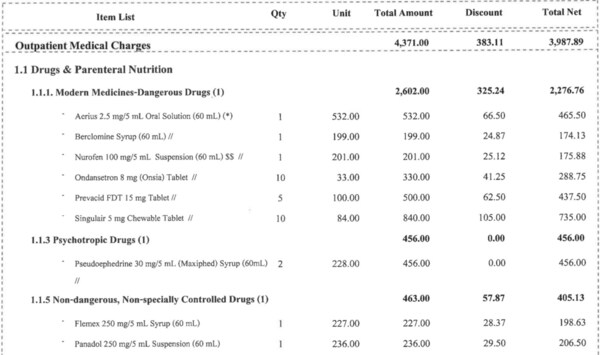SINGAPORE, Aug. 29, 2024 /PRNewswire/ -- Have you ever wondered if the ten prescriptions your doctor gave you for a cold are truly necessary? Or is there a more complex issue of abuse happening behind the scenes?
Today's Case: Overcharging a 7-Year-Old
Somsak (an alias name), a 7-year-old boy from Bangkok developed a fever and cough, he was diagnosed with a common respiratory viral infection in - RSV. Somsak was prescribed an array of prescriptions for influenza A/B, RSV, hMPV, Covid and adenovirus.
A trusted General Practitioner from Canada commented, "The prescription includes several unnecessary medications. While antipyretics and hydration are appropriate, Singulair, Prevacid, and Ondansetron seem excessive without clear indications. The inclusion of Pseudoephedrine and Berclomine also appears unnecessary."The additional medication resulted in ~35% overcharge, impacting both Somsak's family finances and his body with the burden of excessive drugs.
Unfortunately, this is not a rare case from a poorly managed clinic as one might hope, but one of Bangkok's top hospitals, and a widespread case across Asia. To tackle medical fraud and abuse cases, tech companies like Novo AI developed tools to flag inaccuracies and inconsistencies.
Fraud and Abuse in Asian Healthcare
The U.S. Insurance Fraud Association estimates a 3-8% fraud and abuse in medical expenses. In Asia, this figure is ~15% in developed markets like Hong Kong (Sedgwick, 2024) and up to 35% in other parts of the region (Asia Insurance Review, 2023).
Why is this happening? Mature markets spent decades standardizing claims processes using systems like ICD-10s, procedure codes and drug codes. These enables insurers to effectively detect abuse. Despite being widely adopted in North America, implementation in Asia remains inconsistent. Governments lack strong mandates, and many hospitals can't afford medical coders.
With poor incentive for stakeholders, opportunities for abuse arise. Patients end up shouldering the burden-taking unnecessary medications, extra fees and higher premiums.
What Can Be Done?
While systemic changes from governments and hospitals await implementation, GenAI technology can be used to solve this problem at a fraction of the cost.
Novo AI engineered a system that automatically identifies appropriate medical codes and flags for potential overcharging or unnecessary prescriptions. 100% of claims can be reviewed for abuse and billions of dollars saved from everyone's pocket as broader changes gradually take place.
Sometimes, a bottom-up approach can be more effective. After all, it's our health and wallets at stake.
Check out this video.


